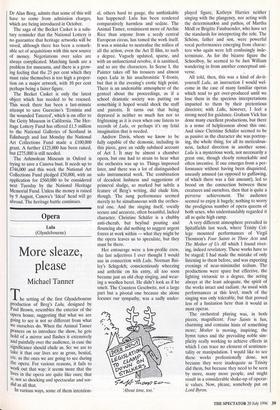Opera
Lulu (Glyndebourne)
More sleaze, please
Michael Tanner
The setting of the first Glyndebourne production of Berg's Lulu, designed by Paul Brown, resembles the exterior of the opera house, suggesting that what we are going to see is not so different from what We ourselves do. When the Animal Tamer prances on to introduce the show, he gets hold of a mirror and flashes it extensively and painfully over the audience, in case the significance should elude us. So: we are to take it that our lives are as gross, bestial, etc. as the ones we are going to see during the opera. For various reasons, it fails to Work out that way: it seems more that the lives in the opera are quite like ours; that Is: not so shocking and spectacular and sor- did as all that.
In various ways, some of them intention- al, others hard to gauge, the unthinkable has happened: Lulu has been rendered comparatively harmless and sedate. The Animal Tamer, reminiscent more of Archie Rice than anyone from a seedy central European circus, has tamed the work itself. It was a mistake to neutralise the milieu of all the action, even the Act II film, to such a degree. Vaguely updated, sparse, and with an unfunctional revolve, it is sanitised, and so are the characters. In Scene I, the Painter takes off his trousers and almost rapes Lulu in his anachronistic Y-fronts, but that is the evening's erotic high point. There is an undeniable atmosphere of the genteel about the proceedings, as if a school dramatic society was putting on something it hoped would shock the staff and parents. It turns out that being depraved is neither so much fun nor so frightening as it is even when one listens to records of Lulu, or perhaps it's my fetid imagination that is needed.
Andrew Davis, whom we know to be fully capable of the demonic, including in this piece, gave an oddly subdued account of Act I. It may be almost a chamber opera, but one had to strain to hear what the orchestra was up to. Things improved later, and there was a lot of distinguished solo instrumental work. The combination of decadent lushness and suggestions of primeval sludge, so marked but subtle a feature of Berg's writing, did elude him, though. The sung performance seemed merely to be simultaneous with the orches- tral one. And the singing itself, vocally secure and accurate, often beautiful, lacked character. Christine Schafer is a chubby anti-cherub, but beyfind pouting and flouncing she did nothing to suggest urgent forces at work within — what they might be the opera leaves us to speculate, but they must be there.
Her entourage were a low-profile crew, the last adjectives I ever thought I would use in connection with Lulu. Norman Bai- ley's Schigolch; conscientiously wheezing and arthritic on his entry, all too soon became just an old chap singing, and wear- ing a woollen beret. He didn't look as if he smelt. The Countess Geschwitz, not a large part but a pivotal one because she alone focuses our sympathy, was a sadly under-
About time, too.' played figure, Kathryn Harries neither singing with the plangency, nor acting with the determination and pathos, of Martha MOdl or Brigitte Fassbaender, who have set the standards for interpreting the role. The Schons, father and son, were powerful vocal performances emerging from charac- ters who again were left confusingly inde- terminate. As for the bizarre figure the Schoolboy, he seemed to be Just William wandering in from another conceptual uni- verse.
All told, then, this was a kind of do-it- yourself Lulu, an instruction I would wel- come in the case of many familiar operas which tend to get over-produced until we lose them in the specious interpretations imparted to them by their pretentious directors; with Ltlitt, hbwever, I feel a strong need for guidance. Graham Vick has done many excellent productions, but there is a sense of helplessness about this one. And since Christine Schafer seemed to be as passive as the character she was portray- ing, the whole thing, for all its meticulous- ness, lacked direction in another sense. Lulu is a mysterious work, not necessarily a great one, though clearly remarkable and often inventive. If one emerges from a per- formance without having been disquieted, uneasily amused (as opposed to guffawing, of which there was a fair amount), led to brood on the connection between these creatures and ourselves, then that is quite a perverse achievement. The audience seemed to enjoy it hugely; nothing to worry the prodigious number of opera queens of both sexes, who understandably regarded it all as quite high camp.
A very different atmosphere prevailed in Spitalfields last week, where Trinity Col- lege mounted performances of Virgil Thomson's Four Saints in Three Acts and The Mother of Us All which I found rivet- ing, indeed revelatory. These works have to be staged; I had made the mistake of only listening to them before, and was expecting evenings of near-minimalist tedium. The productions were spare but effective, the lighting virtuosic to a degree, the acting always at the least adequate, the spirit of the works intact and radiant. As usual with performances at this level, much of the singing was only tolerable, but that proved less of a limitation here than it would in most operas.
The orchestral playing was, in both pieces, magnificent. Four Saints is fun, charming and contains hints of something more; Mother is moving, inspiring, the hymn tunes and the prevailing noble sim- plicity really working to achieve effects in which I can trace no element of sentimen- tality or manipulation. I would like to see these works professionally done, not because they were inadequate as Trinity did them, but because they need to be seen by more, many more people, and might result in a considerable shake-up of operat- ic values. Now, please, somebody put on Lord Byron.


























































 Previous page
Previous page